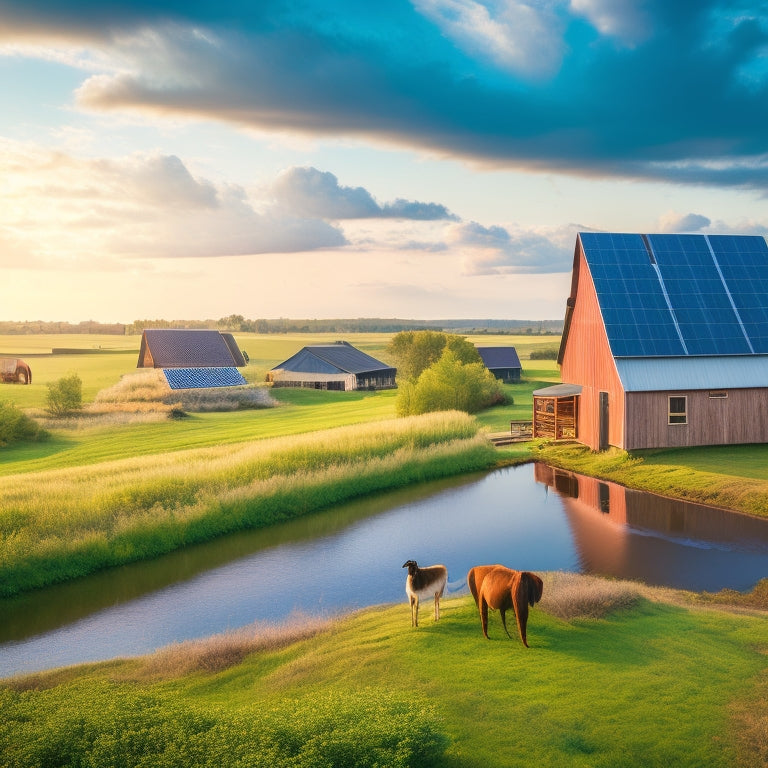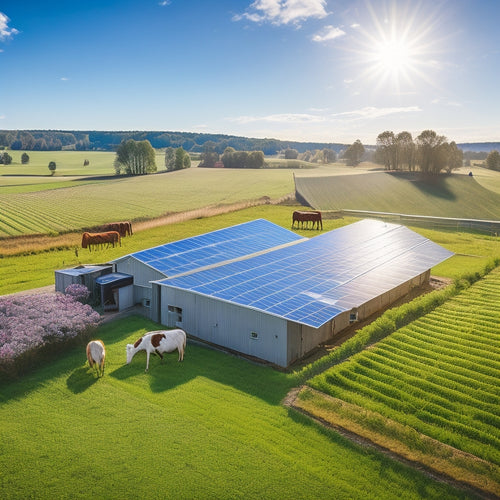
Energizing Livestock Farms With Off-Grid Solutions
Share
By shifting to off-grid solutions, you can greatly reduce your livestock farm's dependence on fossil fuels, decrease energy costs, and minimize your carbon footprint. Solar power for water pumps, electric fencing, and irrigation systems can optimize farm operations and improve animal care. Energy storage guarantees power reliability for farm equipment, while off-grid lighting enhances animal welfare and visibility. Renewable energy systems in farm buildings lessen reliance on non-renewable sources. As you explore off-grid solutions further, you'll discover even more ways to energize your livestock farm sustainably and efficiently.
Key Takeaways
• Off-grid solar power reduces energy costs and carbon footprint for livestock farms, increasing operational efficiency and sustainability.
• Renewable energy integration optimizes farm operations, enhancing animal welfare and productivity through reliable water pumps, fencing, and lighting systems.
• Energy storage and off-grid lighting ensure power reliability, improve farm safety, and reduce accidents, especially during power outages or emergencies.
• Solar-powered irrigation solutions decrease reliance on fossil fuels, optimize water distribution, and increase crop yields, contributing to a more sustainable livestock farm.
• Energy audits and efficient energization methods identify areas for cost savings, reduce energy expenditures, and improve overall farm profitability.
Solar Power for Water Pumps
By integrating solar power into your livestock farm's water pumping system, you can greatly reduce your energy costs and carbon footprint. This is especially beneficial for farms located in remote areas where access to grid power is limited or non-existent.
Solar-powered water pumps can provide a reliable source of energy to meet your farm's water needs, such as irrigation and livestock watering.
To guarantee peak performance, it's vital to take into account factors like water pressure and pump maintenance. Water pressure is pivotal, as it directly affects the pump's efficiency and lifespan. A properly sized pump that can handle the required water pressure will reduce the risk of pump failure and minimize maintenance costs.
Regular pump maintenance is also crucial to prevent clogs, corrosion, and wear and tear. By implementing a routine maintenance schedule, you can identify potential issues before they become major problems, saving you time and resources in the long run.
With solar power and proper pump maintenance, you can enjoy significant cost savings and a reduced environmental impact.
Energy Storage for Farm Equipment
Your farm's equipment, from tractors to milking machines, relies on a steady supply of power to function efficiently, and incorporating energy storage solutions can help guarantee a consistent flow of energy to keep your operations running smoothly.
With energy storage, you can ensure power reliability and reduce downtime caused by grid outages or generator failures. This is especially vital for farms that rely on sensitive equipment, such as milk pasteurization systems or climate-controlled livestock housing.
Grid-Free Electric Fencing Systems
When you're considering grid-free electric fencing systems for your livestock farm, you're likely looking for a reliable and efficient way to keep your animals safe and contained.
You'll want to explore the advantages of solar power, which can greatly reduce your energy costs and carbon footprint.
Solar Power Advantage
Solar power advantageously enables livestock farmers to install grid-free electric fencing systems, providing a reliable and eco-friendly solution for containing and protecting their herds. By harnessing the power of the sun, you can energize your farm's electric fencing systems without relying on traditional grid connections. This approach not only reduces your carbon footprint but also enhances your farm's energy independence.
Here are some key benefits of solar-powered electric fencing systems:
-
Reduced energy costs: Lower your energy expenses by leveraging free solar energy.
-
Increased farm expansion: Expand your farm's operations without being limited by traditional grid connections.
-
Enhanced energy independence: Reduce your reliance on external energy sources and take control of your farm's energy needs.
-
Environmental benefits: Minimize your farm's carbon footprint and contribute to a more sustainable future.
-
Improved herd management: Guarantee the safety and security of your livestock with reliable and efficient electric fencing systems.
Efficient Energization Methods
By adopting efficient energization methods, you can effectively power your grid-free electric fencing systems, ensuring reliable and consistent performance across your livestock farm. This is essential for maintaining animal health, safety, and farm productivity.
One key approach is to implement energy-efficient energizers that minimize power consumption while maintaining the effectiveness of your fencing systems. Conducting regular energy audits can help identify areas of improvement, allowing you to optimize your energy usage and reduce costs.
Additionally, integrating farm automation technologies can streamline your operations, enabling real-time monitoring and control of your fencing systems. This can help you respond quickly to any issues, ensuring your livestock remain safe and secure.
Reliable Off-Grid Options
You can ensure the long-term reliability of your livestock farm's electric fencing systems by selecting grid-free options specifically designed to operate independently of the main power grid. This is especially important for rural areas with limited rural connectivity, where traditional grid-tied systems may be unreliable.
Grid-free electric fencing systems are ideal for farm infrastructure, as they provide a self-sufficient solution that can operate smoothly even during power outages.
Some benefits of grid-free electric fencing systems include:
- Increased reliability: Operates independently of the main power grid, ensuring continuous functionality even during outages.
- Cost-effective: Reduces reliance on external power sources, minimizing energy costs and enhancing farm profitability.
- Improved safety: Reduces the risk of electrical shocks and fires, creating a safer environment for livestock and farm workers.
- Enhanced flexibility: Allows for easy relocation or expansion of fencing systems, providing greater flexibility in farm management.
- Reduced maintenance: Requires minimal upkeep, reducing the need for frequent repairs and replacements.
Off-Grid Lighting for Animal Welfare
As you consider off-grid lighting for your livestock farm, you'll want to prioritize animal welfare by creating an environment that supports their well-being.
By providing adequate lighting, you'll improve animal visibility, reducing stress and anxiety that can come from darkness or poor lighting.
This, in turn, can lead to safer and more productive farm operations.
Improved Animal Visibility
Off-grid lighting solutions greatly enhance animal visibility, leading to improved animal welfare and reduced stress in livestock farms. By providing adequate lighting, you can guarantee that animals are comfortable and relaxed, which is essential for their overall health and well-being. Improved animal visibility also enables you to monitor their behavior, allowing for early detection of any health issues.
Here are some key benefits of improved animal visibility:
-
Enhanced animal monitoring: With better lighting, you can observe animal behavior and identify potential health issues earlier, enabling timely interventions.
-
Accurate health tracking: Improved visibility facilitates regular health checks, enabling you to track animal health and respond promptly to any changes.
-
Optimized farm operations: Adequate lighting helps you navigate the farm efficiently, reducing the risk of accidents and improving overall productivity.
-
Improved animal care: By providing a comfortable and stress-free environment, you can promote animal welfare and reduce the risk of disease.
-
Data-driven decision making: With improved visibility, you can collect more accurate data on animal behavior and health, enabling data-driven decision making.
Reduced Stress Environments
By creating reduced stress environments through strategic lighting design, farmers can greatly mitigate the anxiety and discomfort that often accompanies livestock farming operations.
You can create calming habitats that promote relaxation and reduce stress in your animals. This can be achieved by using off-grid lighting solutions that mimic natural daylight cycles, providing a sense of comfort and familiarity for your livestock.
By replicating natural light patterns, you can create natural sanctuaries that allow your animals to thrive.
For instance, using warm white lighting in the morning and evening can simulate a sunrise and sunset, promoting a sense of calm and reducing stress.
Additionally, using LED lighting with a high color rendering index can help to create a more natural environment, reducing the contrast between light and dark areas.
Enhanced Farm Safety
Implementing off-grid lighting solutions can greatly enhance farm safety by illuminating walkways, reducing tripping hazards, and improving visibility in areas where animals are handled or housed. This not only guarantees your safety but also the well-being of your animals. By providing adequate lighting, you can reduce the risk of accidents and injuries, making your farm a safer environment for everyone.
Some key benefits of off-grid lighting solutions for enhanced farm safety include:
-
Conducting thorough risk assessments to identify areas prone to accidents and implementing lighting solutions to mitigate these risks
-
Improving emergency responses by providing reliable lighting during power outages or nighttime emergencies
-
Enhancing visibility in areas with high animal traffic, reducing the risk of animal escapes or injuries
-
Reducing the risk of slips, trips, and falls by illuminating walkways and corridors
-
Improving overall farm security by deterring intruders and providing a visible deterrent
Renewable Energy for Farm Buildings
You can substantially reduce your farm's reliance on non-renewable energy sources by integrating renewable energy systems into your farm buildings. This not only benefits the environment but also reduces your energy costs.
To maximize the effectiveness of these systems, it's important to optimize your farm buildings' energy efficiency. Proper farm insulation is vital in reducing heat loss and maintaining a consistent indoor temperature. This can be achieved through the use of insulation materials such as fiberglass, cellulose, or spray foam.
Additionally, building orientation plays a significant role in harnessing natural light and heat. By strategically positioning your farm buildings, you can reduce the need for artificial lighting and heating. For instance, buildings with a south-facing orientation can capitalize on natural light and heat from the sun during winter, reducing the need for artificial lighting and heating.
Solar-Powered Irrigation Solutions
Optimizing your farm's energy efficiency extends beyond buildings, and solar-powered irrigation solutions can greatly reduce your reliance on fossil fuels in the field. By harnessing the power of the sun, you can pump water efficiently and sustainably, reducing your carbon footprint and energy costs. This is particularly important for livestock farms, where irrigation plays a vital role in crop growth and animal feed.
Here are some benefits of solar-powered irrigation solutions:
-
Increased crop yields: Solar-powered irrigation guarantees that your crops receive the right amount of water, resulting in healthier plants and higher yields.
-
Water conservation: By using solar power, you can minimize water waste and optimize your irrigation system for maximum efficiency.
-
Real-time crop monitoring: Solar-powered irrigation systems can be integrated with crop monitoring technologies, enabling you to track soil moisture levels, temperature, and other factors that impact crop growth.
-
Reduced energy costs: Solar power is a renewable energy source, reducing your dependence on fossil fuels and lowering your energy costs.
-
Increased farm productivity: With a reliable and efficient irrigation system, you can focus on other aspects of your farm, increasing overall productivity and profitability.
Cost Savings With Solar Energy
By shifting to solar energy, your livestock farm can reduce energy expenditures considerably, freeing up resources to invest in other critical areas of your operation. Solar energy can help you save money on fuel subsidies, which can be a significant expense for livestock farms. Conducting energy audits can help identify areas where solar energy can be effectively utilized, leading to substantial cost savings.
| Cost Savings | Description |
|---|---|
| Reduced Energy Expenditures | Solar energy can reduce your energy bills, freeing up resources for other critical areas of your operation. |
| Lower Fuel Subsidies | Solar energy can help reduce your reliance on fuel subsidies, leading to significant cost savings. |
| Increased Efficiency | Energy audits can help identify areas where solar energy can increase efficiency, leading to further cost savings. |
| Environmentally Friendly | Solar energy is a clean and environmentally friendly source of energy, reducing your farm's carbon footprint. |
Frequently Asked Questions
Can Solar Power Systems Be Customized for Small-Scale Farms?
You can tailor solar power systems for small-scale farms by evaluating your farm layout to optimize energy efficiency, identifying areas with maximum sunlight exposure, and selecting equipment tailored to your specific energy needs.
How Often Should Energy Storage Systems Be Maintained?
You should maintain energy storage systems regularly to prevent system downtime and guarantee maximum battery lifespan. Schedule quarterly checks to inspect connections, clean terminals, and monitor charging cycles to prevent capacity degradation.
Are Off-Grid Electric Fencing Systems Compatible With Existing Fencing?
You'll find that off-grid electric fencing systems are compatible with existing fencing, regardless of fencing materials, as long as energy efficiency is maintained through proper installation and regular maintenance.
Do Renewable Energy Solutions Require Specialized Farming Knowledge?
You don't need to be an energy expert, but having basic Energy Literacy and undergoing Farmhand Training can help you understand and effectively implement renewable energy solutions on your farm.
Can Solar-Powered Irrigation Systems Be Integrated With Existing Pumps?
You can integrate solar-powered irrigation systems with existing pumps, optimizing water efficiency by harnessing renewable energy to power pumps, and leveraging pump optimization techniques to minimize energy consumption and maximize water distribution.
Related Posts
-

What Do I Need to Know About Farm Solar Panels
When considering farm solar panels, you need to assess costs, benefits, and technical specifics. Initial investment c...
-

Key Components of a Reliable Emergency Power Supply System
A reliable emergency power supply system requires several key components. You need proven performance metrics to guar...
-

The Future of Residential Energy Storage
The future of residential energy storage looks promising and cost-effective for you. With lithium-ion battery prices ...


